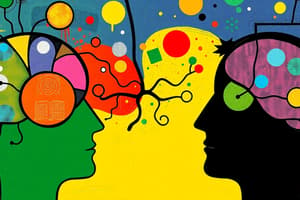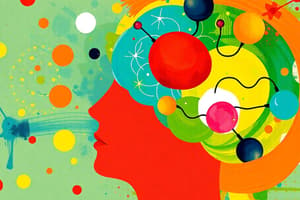Podcast
Questions and Answers
What is problem-solving?
What is problem-solving?
- The process of achieving a goal by overcoming obstacles (correct)
- The process of avoiding obstacles to achieve a goal
- The process of creating obstacles to achieve a goal
- The process of ignoring obstacles to achieve a goal
What are the two major domains of problem-solving?
What are the two major domains of problem-solving?
- Mathematical and personal problem-solving (correct)
- Social and emotional problem-solving
- Formal and informal problem-solving
- Simple and complex problem-solving
What are the common steps in the problem-solving cycle?
What are the common steps in the problem-solving cycle?
- Defining the problem, coming up with a random solution, and hoping it works
- Developing a strategy to fix the problem, ignoring available resources, and hoping for the best
- Ignoring the problem, hoping it goes away, and then panicking
- Recognizing the problem, defining it, developing a strategy to fix it, organizing knowledge and resources available, monitoring progress, and evaluating the effectiveness of the solution (correct)
What is insight in problem-solving?
What is insight in problem-solving?
What are some common barriers to problem-solving?
What are some common barriers to problem-solving?
What are some problem-solving strategies?
What are some problem-solving strategies?
What are some problem-solving methods?
What are some problem-solving methods?
What is crowdsourcing?
What is crowdsourcing?
What is collaborative problem-solving?
What is collaborative problem-solving?
Study Notes
Approaches to Problem Solving
-
Problem solving is the process of achieving a goal by overcoming obstacles.
-
Problems can be simple or complex, well-defined or ill-defined, formal or socio-emotional.
-
Solutions require sufficient resources and knowledge to attain the goal.
-
Specialized problem-solving techniques and methods exist in various fields such as engineering, business, medicine, mathematics, computer science, philosophy, and social organization.
-
Mental techniques to identify, analyze, and solve problems are studied in psychology and cognitive sciences.
-
Problem-solving has two major domains: mathematical and personal problem-solving.
-
Common steps in the problem-solving cycle include recognizing the problem, defining it, developing a strategy to fix it, organizing knowledge and resources available, monitoring progress, and evaluating the effectiveness of the solution.
-
Insight is the sudden aha! solution to a problem, the birth of a new idea to simplify a complex situation.
-
Common barriers to problem-solving are mental constructs that impede an efficient search for solutions, including confirmation bias, mental set, functional fixedness, unnecessary constraints, and irrelevant information.
-
Problem-solving strategies include trial and error, algorithm, heuristics, and insight.
-
Problem-solving methods include brainstorming, lateral thinking, and root cause analysis.
-
Unnecessary constraints are arbitrary boundaries imposed unconsciously on the task at hand, which foreclose a productive avenue of solution.Understanding Problem Solving: Cognitive Biases and Dreaming
-
Fixation on only one type of solution can occur due to mental set.
-
Mentally invented constraints can impede problem-solving, as demonstrated by the dot problem.
-
Irrelevant information in a problem can make it harder to solve.
-
Problem representation can affect problem-solving, as demonstrated by the Buddhist monk problem.
-
People tend to overlook subtractive changes when solving problems.
-
Problem-solving can occur during dreaming.
-
Researchers in cognitive science have different approaches to studying problem-solving, with North American research focusing on natural knowledge domains and European research focusing on novel, complex problems.
-
Complex problem-solving involves one or more obstacles at a time.
-
Collective problem-solving can be performed by groups and is necessary for solving social and global issues.
-
Collaborative problem-solving can promote critical thinking skills, problem-solving skills, social skills, and self-esteem.
-
Crowdsourcing is a process of accumulating ideas, thoughts, or information from many independent participants to find the best solution for a given challenge.
Studying That Suits You
Use AI to generate personalized quizzes and flashcards to suit your learning preferences.
Description
Are you a problem-solving pro or do you struggle to find solutions? Test your knowledge and learn about different approaches to problem-solving with our quiz. From identifying and defining the problem to evaluating the effectiveness of the solution, this quiz covers the common steps in the problem-solving cycle. Plus, you'll discover mental techniques, common barriers, and problem-solving strategies to help you tackle any challenge. Whether you're a student, professional, or just looking to improve your problem-solving skills, this quiz is for you




